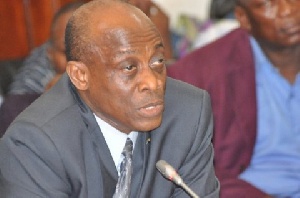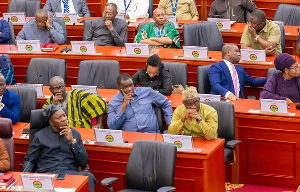Former Finance Minister, Seth Terkper, has called for a continued focus on increasing the value of the Sinking Fund with a view of using it to retire maturing debts.
He said the Sinking Fund would help the economy reduce the debt stock, interest rates, as well as improve overall yields and sovereign ratings.
“We must continue to build the Sinking Fund from the additional crude oil and gas revenues from the Sankofa and Tweneboa Enyenra Ntomme (TEN) fields in order to make our economy’s fast-growing public debt more sustainable,” he said.
The Sinking Fund, which was established under Mr Terkper’s reign as Finance Minister, requires the allocation of a percentage of oil revenue from the Stabilization Fund in order to retire the nation’s domestic and foreign bonds so as to avoid debt default or refinancing at high-interest rate.
Speaking with the media in Accra on a wide-range of issues regarding the development of new models of retiring the country’s external debt, Mr Terkper said the country could point the right signals to the capital markets through these appropriate policies.
Explaining the essence of the implementation of the Sinking Fund under the past administration, Mr. Terkper said it was to ensure the retiring of maturing debts, which were becoming a problem because of lack of plans for retiring domestic and foreign bonds.
According to Mr. Terkper, the nation had used over $350 million of oil proceeds from only the Jubilee Fields to retire its sovereign bonds.
He, therefore, expressed his concerns that the Fund has been allowed to accumulate over US$800 million since 2017 without utilization, as was the case in 2015 and 2016.
He argued that there is sufficient legal backing for the measures under the Constitution, the Petroleum Revenue Management Act (PRMA) and the Public Financial Management Act (PFMA).
Currently, according to the PRMA reports submitted to Parliament, the Sinking Fund has accrued about US$850 million, due largely to the recent increase in crude oil prices, as well as an additional production of oil and gas from the Tweneboa Enyenra Ntomme (TEN) and Sankofa oil fields.
“If we had continued using our Sinking Fund alone, we would be able to reduce our external bonds or use it to complement our liability management strategy. My problem about not utilizing the Sinking Fund is that we are holding US$850 million, which we should have used to mitigate our external debt,” he said.
Mr Terkper explained to the press that the flows into the Sinking Fund and subsequent use of same to “buy-back” the sovereign bonds are based on capping the Stabilization Fund and channelling the annual excess flows into debt and contingency management, as required by the Petroleum Revenue Management Act (PRMA).
“The combined Sinking Fund and ‘Buy-Back’ programme means that Ghana was gradually lowering the ‘roll-over’ risk associated with its long-standing ‘interest-only’ loan payment policy for bills and bonds. The nation is on course to replace them with gradual redemption of the principal element of these so-called ‘bullet’ loans,” Mr. Terkper said.
He explained that the Stabilization Fund itself was set-up under the PRMA as a conditional or rules-based savings account to provide a buffer for the budget by minimizing the adverse impact of deficits on the economy.
Overall, Ghana had used US$336 million of the Sinking Fund by December 2016 to buy back the 2007 and other domestic and foreign debt.
Ghana also used US$100 million of the 2014 and US$216 million of the 2016 Bond proceeds to augment the retirement of the 2007 Bond, through a liability management or exchange plan for its new and old bonds.
Hence, Ghana has been able to extend the maturity for the 2014 to 2016 bonds to 2030 and expects to cover 75 per cent or more of the annual average obligation of US$300 million from the Sinking Fund and flows from commercial projects under the DSR’s “self-financing” plan.
Mr. Terkper said there was the need to augment the Sinking Fund with other measures, notably the ‘self-financing’ strategy that requires that we repay loans from the revenues generated by commercial projects and not put the burden on the taxpayer.
“We must establish the Debt Management Office (DMO) proposed in the PFMA to implement these proposals to make our debt sustainable again,” he said.
Business News of Wednesday, 13 June 2018
Source: ghananewsagency.org













